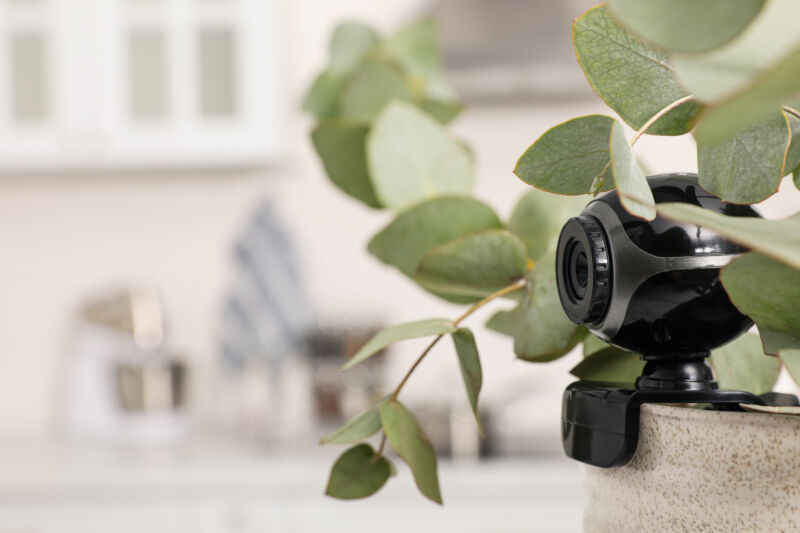
Airbnb, like hotels and rival vacation rental site Vrbo, will no longer allow hosts to record guests while they’re inside the property. Airbnb previously allowed hosts to have disclosed cameras outside the property and in “common areas” inside, but Airbnb’s enforcement of the policy and the rules’ lack of specificity made camera use troubling for renters.
Airbnb announced today that as of April 30, it’s “banning the use of indoor security cameras in listings globally as part of efforts to simplify our policy on security cameras and other devices” and to prioritize privacy.
Cameras that are turned off but inside the property will also be banned, as are indoor recording devices. Airbnb’s updated policy defines cameras and recording devices as “any device that records or transmits video, images, or audio, such as a baby monitor, doorbell camera, or other camera.”
Also starting April 30, Airbnb will require hosts to disclose the presence of noise decibel monitors. Airbnb said it will only allow noise-monitoring devices that “do not record or transmit sounds or conversations” and that these are also “only allowed in common spaces of listings.”
Room for interpretation
Airbnb’s old policy allowed hosts to have cameras inside the property as long as the cameras weren’t hidden. The policy stated that Airbnb allowed: “Devices that allow for viewing or monitoring of only a public space (ex: a front door or a driveway) or a common space that are clearly identified and disclosed ahead of a reservation,” per an archived version of the policy. The policy added that “common spaces do not include sleeping areas or bathrooms” and listed “bedrooms, bathrooms, or common areas that are being used as sleeping areas, like a living room with a sofa bed)” as examples of private spaces.
This policy dramatically differed from the rules of other hospitality businesses. Hotels typically don’t surveil guests after they’re in their room, for example.
Also alarming was the vagueness of Airbnb’s policy. What about rooms with a futon or a couch that isn’t literally listed as a “sofa bed” but is roomy enough for slumber? Could a policy-abiding camera be placed in that room? Airbnb’s updated policy for noise decibel monitors, which allows them inside but only “in a common space,” still doesn’t address the potential for broad interpretations of the phrase.
Renters can see if a listing has cameras or noise-monitoring devices under the “Home safety” section of a listing’s amenities section, but that could include dozens of so-called amenities.
Airbnb’s old policy didn’t force hosts to state cameras’ locations. A rental I currently have booked under the old policy, for example, merely states that it has “security cameras to ensure the safety of guests and property.” That doesn’t clearly specify where the cameras are and if they’re indoors or only outdoors.
Another example of gaps in Airbnb’s policy for unspecified surveillance comes from Jeffrey Bigham. In 2019, he detailed his experience when Airbnb originally told him that a photo in an Airbnb listing with a camera subtly sitting in the walls’ corner counted as disclosure of indoor camera usage (after the blog went viral, the user reported receiving a refund). Bigham noted that even though the camera was technically in a common area (the living room), it was “very likely that my 2-year-old ran in front of this camera naked (the field of view of the camera was close to the exit of the bathroom).”
Airbnb’s announcement today said those who break the new policies will be subject to investigation and disciplinary action, which may include the removal of a listing or account.
However, Airbnb has a spotted history of responding to renter surveillance complaints. For example, in 2019, Ars Technica reported on a family finding a hidden camera inside their Airbnb that was disguised as a smoke or carbon monoxide detector. Airbnb initially “exonerated” the host of wrongdoing but eventually refunded the family and banned the host. Other Airbnb hosts have also previously claimed to see lax response from Airbnb after upsetting renters with surveillance cameras.
Airbnb hosts have long relied on technology to help spot problems like unwarranted guests, messes, parties, and robberies. But even outdoor surveillance can perturb renters, as the use of outdoor cameras can be overbearing and uncomfortable.
Airbnb previously claimed that hidden cameras are an exception. The company said today that the majority of its listings “do not report having a security camera” but didn’t share specific numbers.
https://arstechnica.com/?p=2009366

